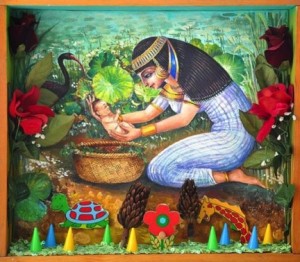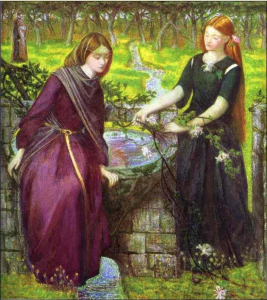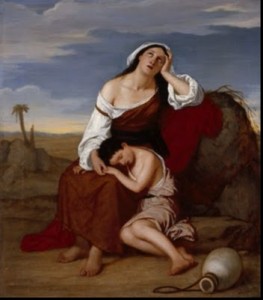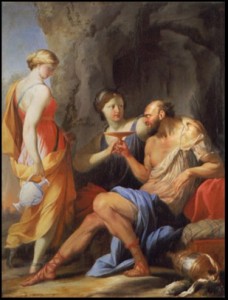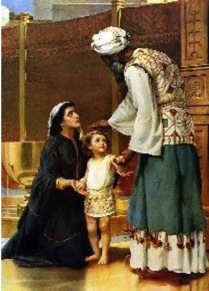Once Moses’ mother, Jocheved, paradoxically obeyed Pharaoh and “threw” her son in the Nile, Pharaoh’s daughter discovered the baby. Moses’ sister followed the basket and offered the king’s daughter suggestions on how to care for the child. Daughters are prominent in this part of the story, the word occurring six times. “Certainly our attention is being drawn to the ironic connection between Pharaoh’s intent to spare the daughters and the fact that a succession of daughters, the last being his own, contributes to his undoing” (Ackerman, p.95). Overall women dominate the first chapters of Exodus prompting us to wonder about the significance of women in ancient Israelite storytelling. “The question is not why does a story of daughters form the prelude to the exodus, but rather: what effect do these stories about women have on the way we read the exodus story as a whole?” (Exum, p. 60). In particular, I want to explore the way in which the king of Egypt’s own daughter determined the outcome of the story of the exodus. Continue reading Pharaoh’s Daughter
Tag Archives: naming children
Rachel & Leah: God Wrestlers
I find a lot of tension in the story of Leah and Rachel. On the one hand, the (male?) narrator measured the women by the number of sons they bore and in the case of Rachel on her physical beauty as well. Continue reading Rachel & Leah: God Wrestlers
Hagar’s Exodus and Exile
Hagar is the only person in the Bible to give God a name and the only woman to be promised a nation. “None of the mothers of Israel is her equal in this regard” (Fischer, p.18). Yet she is subjected to some of the greatest degradation in the scriptures. Her story has even been used to sanction slavery. White American slaveholders in the mid-1800s took God’s command to Hagar “Return, submit,” as legitimizing the slavery system. But the same text has been a source of hope for liberation by African American communities. Continue reading Hagar’s Exodus and Exile
Eve Speaks for Herself
Where Christianity and rabbinic Judaism have condemned Eve as lustful and evil, many modern feminists have discarded Eve. Compared to Lilith, “Adam’s First Wife” who is not mentioned in Genesis, Eve has been labeled docile and obedient to patriarchy. Continue reading Eve Speaks for Herself
Lot’s Daughters
In Deuteronomy God wants to be perfectly clear with Moses that Yahweh has a covenantal relationship with Lot’s descendants and that their lands are to be respected. In other words, God condones the incestuous actions of Lot’s daughters which resulted in the two nations being given ancestral lands east of the Jordan. More than matriarchs of great nations, the daughters are also depicted as the ancestors of Ruth through whom the Davidic and Messianic line flows and Naamah, the Ammonite wife of King Solomon, mother of Rehoboam, King of Judea. Indeed, Lot and his daughters appear to hold an illustrious place in biblical history right alongside Abraham, Sarah and their descendants. As modern readers, we are challenged by this inference and must return to the story of Lot and his daughters to consider more carefully the nuances of this incestuous tale. Continue reading Lot’s Daughters
Hannah and the Sacred Medium of Language
At first glance, Hannah’s tale is a typical patriarchal tale reinforcing a woman’s role and function as merely biological; maternal yearnings are not personal but a result of a social setting that prizes women for their reproductive potential above all else. Continue reading Hannah and the Sacred Medium of Language

